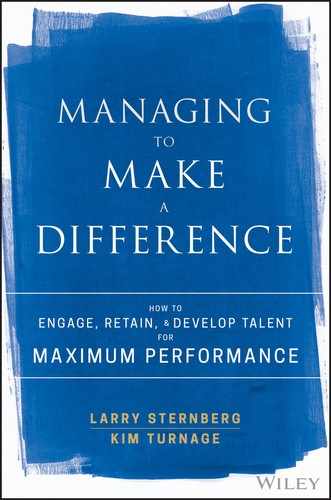Chapter 10
Forgive
What happens when you are on the other side of an apology, in the position to forgive someone who has wronged you in some way? For a manager, the opportunity to forgive most commonly arises when an employee has screwed up. She has done something you, as her manager, perceive to be mistaken, wrong, or otherwise unacceptable. Assume that this mistake is not trivial. It causes a significant problem in the business, and maybe it even hurts you personally. The following example involves possibly the biggest screw-up of Larry's professional career.
Forgiveness does not require you to forget the act or deny that it was wrong. It involves letting go of resentment and thoughts of revenge. Fred Luskin is a pioneer in the science and practice of forgiveness and leader of the Stanford Forgiveness Projects. He describes forgiveness as “resilience in the face of unwanted outcomes.”1 The issue is less about forgetting and more about letting go of all the negative feelings we experience when things do not go the way we want.
If you do not forgive, the negative feelings you retain will infect your relationships with the people involved and taint the way you treat each other, thereby undermining success for both of you. Furthermore, holding a grudge is bad for your health.2 Just thinking about an old grudge increases physical responses like blood pressure, heart rate, and muscle tension and leads people to feel angrier, more anxious, and less in control. By contrast, just thinking about forgiving (or at least empathizing with) someone who has wronged you reverses those physical effects and diminishes the feelings that go along with them.3
In case being healthier and feeling better is not motivation enough, forgiveness can actually increase productivity and performance in a business setting. In a study that began after the stock market crash of 2000, Luskin's team provided training on emotional competence and forgiveness to financial advisors working for American Express Financial Services. Participants in the training increased their sales by 25 percent—more than double the 10 percent increase their peers who did not participate achieved over the same period.4 More recent research concurs that forgiveness in the workplace is linked to increased productivity, decreased absenteeism, fewer mental and physical health problems, better decision making, improved cognitive functioning and higher quality of relationships while holding on to grudges is associated with higher aggression, lower collaboration, and greater disengagement.5
All the evidence converges on the idea that forgiveness makes a positive difference for everyone involved—even for the bottom line. Look, we are all going to screw up at times. We are human beings, for goodness sake. We all need forgiveness. And the research shows that we are all better off when we learn how to forgive. Holding a grudge comes at a cost. You will be seen as petty and mean-spirited. You will drive up turnover, diminish collaboration, undermine your chances for success, and put your own health at risk. Who needs that? Life is short. Whatever it is, get over it. Let it go. Everyone will be glad you did, especially you.
